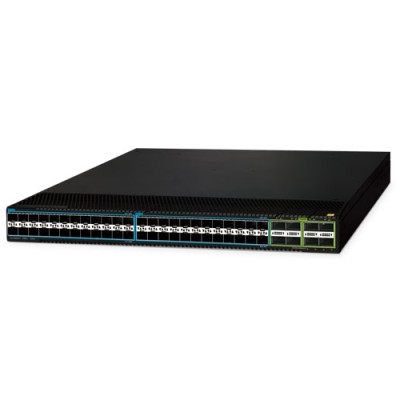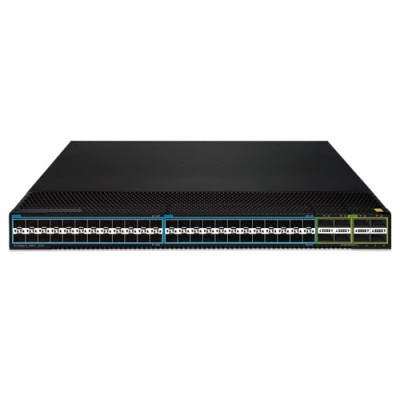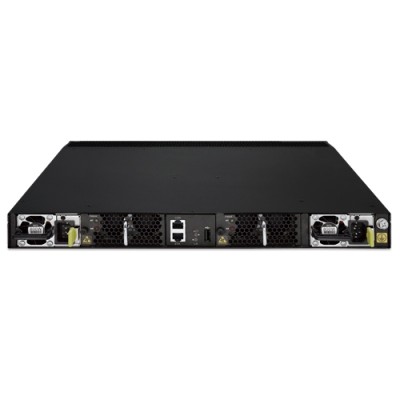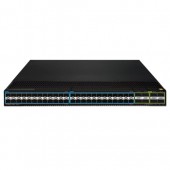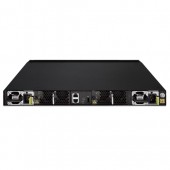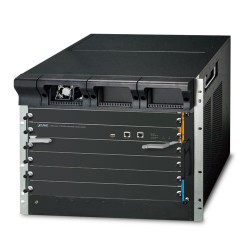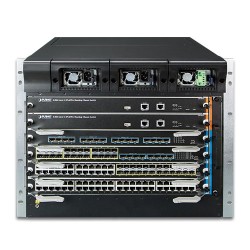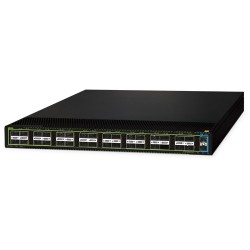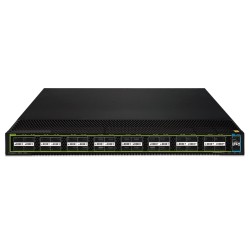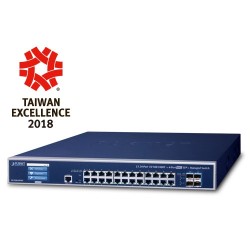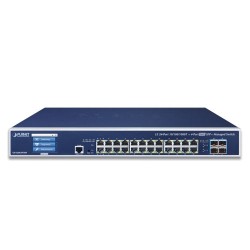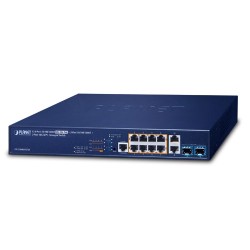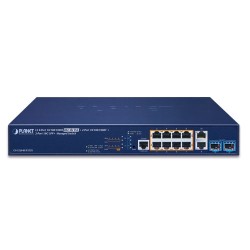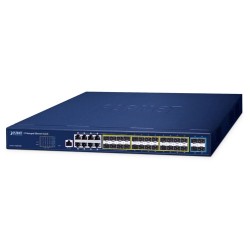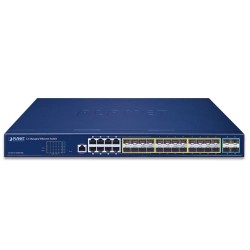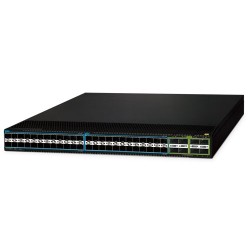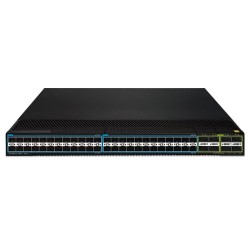- Stock: In Stock
- Brand: PLANET
- Model: DCS-7342-48Y8C
- Weight: 9.00kg
- Dimensions: 44.00cm x 42.00cm x 4.40cm
Comprehensive Overview of Planet's Data Center Switch
Planet's DCS-7342-48Y8C data center switch, tailored to meet the complex demands and high-performance standards of modern data centers, offers high performance and flexibility. It excels in providing comprehensive Layer 2, Layer 3, and Layer 4 functionalities, supporting up to 48 25G SFP28 ports and 8 100G/40G QSFP28 ports capable of 40G and 100G connectivity. The switch is equipped with robust Layer 3 routing protocols including OSPF, and BGP, addressing the complexities of network architectures. This ensures seamless data transmission and high bandwidth, making it ideal for cloud computing environments, large enterprise data centers, high-frequency trading, and large-scale content delivery networks (CDN).
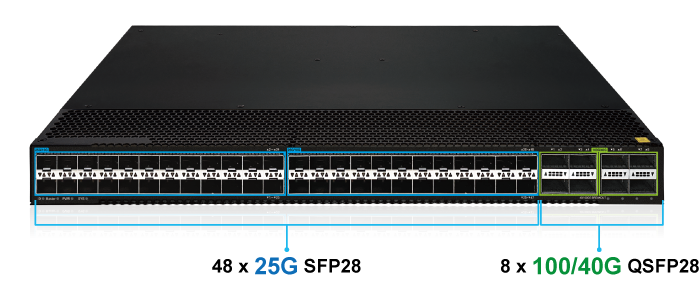
Robust Data Center Switch Solution for Scalable Networks
Designed for scalability and robust performance, Planet's data center switch features powerful Layer 3 routing capabilities and supports 100G/40G uplink interfaces. It is built into a durable chassis, allowing administrators to select suitable QSFP transceivers for efficient network expansion and coverage. The switch securely handles large data volumes, making it perfect for data center backbone networks and high-capacity servers. It excels in supporting critical applications like VoIP, video streaming, and multicast, ensuring reliable network performance.
Enhanced Reliability with MLAG
Planet's data center switch integrates MLAG (Multi-chassis Link Aggregation Group) technology, enhancing network reliability in critical environments. MLAG allows multiple switches to function as a unified entity, ensuring seamless failover and increased bandwidth utilization. This technology synchronizes configurations and state information between paired switches, minimizing downtime and optimizing network resilience. Ideal for high-demand applications like enterprise data centers and cloud environments, MLAG on Planet's switch supports uninterrupted connectivity and scalability without compromising performance.
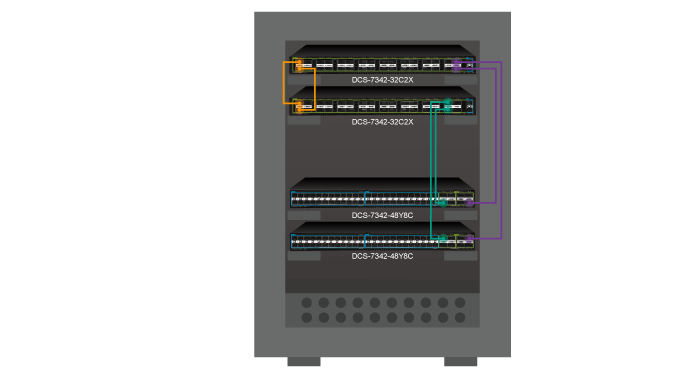
VXLAN Technology Support and Application
Support for VXLAN technology, including Layer 2 and Layer 3 switching functionalities and EVPN VXLAN support, extends IPv6 application capabilities over IPv4 infrastructure.
Enhance Network Management and Scalability through Stacking
Planet's data center switch supports stacking functionality. With stacking technology, administrators can virtualize multiple switches into a single logical device, simplifying network management and expansion. Stacking enhances network reliability and availability by sharing ports and enables intelligent management functions, thereby optimizing resource utilization and facilitating flexible network configurations. This makes Planet's data center switch an ideal choice for handling large-scale network requirements, meeting enterprises' needs for high performance and scalability.
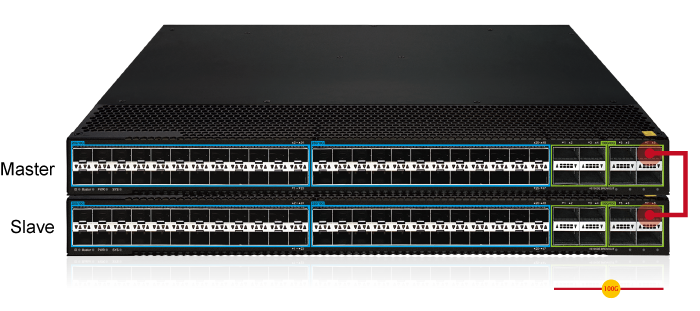
High Availability, Advanced Security and Energy Efficiency
Ensuring high availability, the switch features redundant power supplies and smart fans. Built-in CLI management tools enhance configuration and monitoring convenience, ensuring reliability in various environments. Advanced Security features and an energy-efficient design enhance operational efficiency and environmental sustainability. Layer 4 functionalities refine network management, improving the overall efficiency and responsiveness.
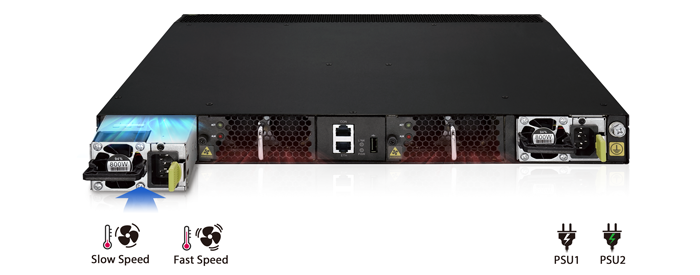
High-Density Port Configuration
The switch supports high-density port configurations such as 25G, 40G and 100G ports, facilitating large-scale data transmission and high-bandwidth applications.
Advanced QoS and Data Security
Advanced Quality of Service (QoS) support ensures efficient transmission of critical business data through intelligent traffic management and prioritization. Advanced security features including ACLs, port security, and data encryption protect against unauthorized access and malicious attacks.
Energy-Efficient Design
Optimizing energy utilization efficiency, the switch reduces energy consumption and meets environmental standards. Smart fans adjust speed based on temperature and workload, ensuring efficient cooling with minimal power usage and noise.
VLAN, Q-in-Q and Traffic Management
Extensive VLAN support with up to 4,000 VLAN IDs and support for Q-in-Q and flexible Q-in-Q functionalities enable dynamic network segmentation and secure isolation. Support for IGMP and MLD Snooping optimizes multicast traffic management, ensuring efficient network operations and resource utilization.
Network Performance and Flexibility
Integrated features make the data center switch an ideal choice for handling large-scale data and complex network environments, providing robust support for network architecture and future expansions.
Cloud Computing Data Centers
Planet's DCS-7342-48Y8C data center switch is deployed in a large cloud computing data center to handle the high demands of virtual machine migration, big data analytics, and real-time processing. With 48 25G SFP28 ports and 8 QSFP28 ports capable of 40G and 100G connectivity, the switch ensures high bandwidth and low latency, essential for efficient cloud operations. The advanced Layer 2, Layer 3, and Layer 4 functionalities enable seamless integration and management of diverse cloud services, improving overall performance and reliability.
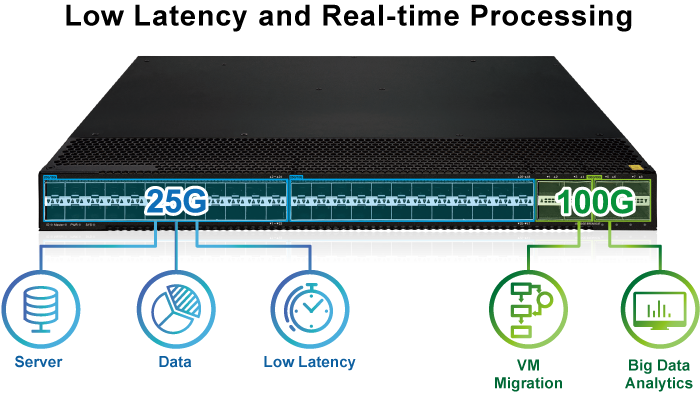
Enterprise Data Centers
In a large enterprise data center, PLANET DCS-7342 series is deployed to connect hundreds of servers and storage devices, supporting critical business applications such as enterprise resource planning (ERP), customer relationship management (CRM), and database services. The powerful VXLAN routing capabilities and 100G uplink support of these switches ensure efficient network segmentation and high availability, facilitating smooth operation for mission-critical applications.
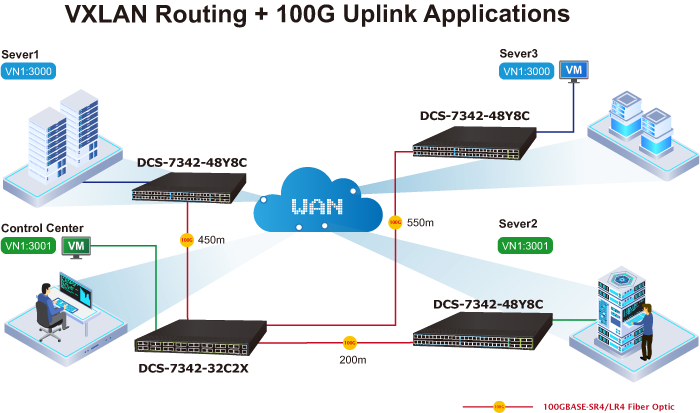
High-Frequency Trading Networks
In a high-frequency trading firm, Planet's data center switch is deployed to ensure ultra-low latency and high reliability for trading operations. The switch supports MLAG technology, allowing multiple switches to function as a unified entity, which is crucial for seamless failover and maximizing bandwidth utilization. Advanced security features and an energy-efficient design further enhance the switch's performance in handling the demanding environment of high-frequency trading, ensuring uninterrupted and secure trading activities.
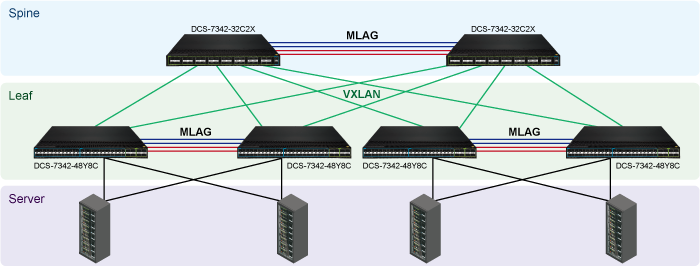
Physical Ports
- 48-Port 25G SFP28
- 8-Port 100G/40G QSFP28
- RJ45 to DB9 console interface for switch basic management and setup
Stacking Features
- Hardware Stacking
- Virtualized multiple Planet`s data center switch series stacked into one logical device
- Connects with stack member via 25G SFP28 and 100G/40G QSFP28 interfaces
- Single IP address stack management, supporting up to 2 hardware units stacked together
- Stacking architecture supports redundant ring mode
IP Routing Features
- IPv4 static routing
- IPv4 dynamic routing protocols such as OSPFv2, IS-IS and BGP
- IPv6 dynamic routing protocols such as OSPFv3, RIPng, BGP4 and BGP4+
- DHCP/DHCPv6 snooping VLAN-based
- GRE tunneling
- Equal-cost routing
- Policy-based routing
- Neighbor Discovery (ND)
- Path MTU Discovery (PMTU)
- IPv6 Ping and IPv6 Telnet
- ACL based on source IPv6 address, destination IPv6 address, Layer 4 port, and protocol type
- Dual-stack for IPv4 and IPv6
- Multiple tunneling techniques
- BFD session binding static routes, VRRP, OSPF, IS-IS, and BGP
Multicast Routing Features
- Supports PIM-DM (Protocol Independent Multicast – Dense Mode)
- Supports IGMP v1/v2/v3
Layer 2 Features
- Supports VXLAN Layer 2 Switching, Routing Switching, and Layer 3 Gateway
- Supports EVPN VXLAN
- Supports IPv6 VXLAN over IPv4
- Supports Link Aggregation
- 802.3ad Link Aggregation Control Protocol (LACP)
- Multi-Chassis Link Aggregation (MLAG)
- Static configuration and dynamic MAC learning
- MAC browsing and removal
- Configurable aging time of the MAC address
- Limited number of learnable MAC addresses
- MAC filtration
- Black-hole MAC list
- IEEE 802.1AE MacSec
- Supports up to 4K VLANs
- 1:1 and N:1 VLAN Mapping based on 802.1p
- Q-in-Q and enhanced flexible Q-in-Q
- Supports 802.1d STP, 802.1w RSTP and 802.1s MSTP
- BPDU Protection
- Root Protection
- Loop Protection
- Supports IGMP v1/v2c/v3
- IGMP Snooping
- MLD snooping
- Supports L2-L4 packet filtering
- Filters based on MAC, IP, port, protocol, IP ToS, 802.1p priority, VLAN ID, SVLAN ID, VLAN range, etc.
- Supports cross-device link aggregation
- Supports port mirroring and flow mirroring
- Link Layer Discovery Protocol (LLDP)
Quality of Service
- L2-L4 packet filtering with filters based on MAC, IP, port, protocol, IP ToS, 802.1p priority, VLAN ID, SVLAN ID, VLAN range, etc.
- ACL based on time periods
- DLF (Destination Lookup Failure) storm suppression, multicast storm suppression, and broadcast storm suppression
- Port-based bandwidth limiting
- Flow/VLAN-based bandwidth limiting (single-rate two-color, single-rate three-color, dual-rate three-color)
- Priority-based scheduling and priority mapping for flows
- SP/PQ (Strict Priority/Priority Queuing), DRR (Deficit Round Robin), and SP/PQ+DRR scheduling algorithms
- Queue management policies such as tail drop and WRED (Weighted Random Early Detection)
- 8 hardware priority queues per port
- 802.1p, DSCP/ToS priority marking
Multicast
- Supports IPv4 IGMP snooping v1, v2 and v3
- Supports IPv6 MLD snooping v1 and v2
- MVR (Multicast VLAN Registration)
Security
- User permission classification management and command line classification protection
- Authentication support for 802.1x, RADIUS, and TACACS+
- User level quantity limitation
- User binding (port, source MAC, source IP address access control)
- SNMP login terminal restriction
- SSH v2.0 support
- DDoS attack prevention
- IP Source Guard support
- MAC black hole support
- MAC address quantity limitation
- Static ARP, Gratuitous ARP, ARP inspection
Management
- Supports Console, Telnet and SSH terminal services (5 simultaneous Telnet / SSH sessions at least)
- Supports SNMPv1/v2/v3 network management protocols and standard MIB for general features
- Supports NETCONF network management protocol
- Supports file upload and download via FTP and TFTP methods, unified management of logs, alarms and debug information
- Supports user operation logs and RMON (Remote Monitoring)
- Supports port mirroring and flow mirroring
- Supports BootROM upgrade, remote online upgrade and hot patch
- Supports fan temperature control for automatic adjustment
- Supports temperature and fan monitoring with alerts
- SNMP trap for interface Link Up and Link Down notification
- Network Time Protocol (NTP), RSPAN
- DHCP Functions
- DHCP Client/Relay/Server
- DHCP Option 43/60/82
- DHCP Relay per VLAN
- DHCPv6 Relay/Server
Redundant Power System
- Supports dual power redundancy and redundant backup for two sets of fans (Include 2 power DCS-PWR800AC)
- Hot-swappable power modules and fans
| Hardware Specifications | |
|---|---|
| Switching capacity | 4Tbps |
| Forwarding Rate | 2000Mpps |
| Power supply | 2 (DCS-PWR800AC) |
| Power Supply Slot | 2 Supports 1+1 backup and hot swapping |
| 10G Ports | - |
| 25G Ports | 48-port 25G SFP28 Backward compatible with 10GBASE-X SFP+ |
| 100G Ports | 8-port 100G QSFP28 Backward compatible with 40G QSFP+ |
| Console | 1 x RJ45-to-RS232 serial port (115200, 8, N, 1) |
| Management Port | 1 x 10/100/1000BASE-T RJ45 port |
| USB | 1 x USB 2.0 Type A for USB storage device use (Configuration backup and restore) |
| Fan | 2 hot-pluggable fan modules |
| Dimensions (W x D x H) | 440 x 400 x 44 mm |
| Weight | 8.1kg with dual modular power supplies |
| Power Supply | AC: 100-240V, 50Hz±10% |
| Power Consumption | Maximum 207W/706.3 BTU(full loading) |
| Switching Specifications | |
| Switch Architecture | Store-and-forward |
| Switch Fabric | 4.0Tbps/non-blocking |
| Switch Throughput | 4Tbps@64bytes |
| Address Table | 96K MAC address table with auto learning function |
| ARP Table | 100K |
| IP Interfaces | Max. 4K VLAN interfaces |
| Routing Table | IPv4 128K entries IPv6 64K entries |
| Multicast Table | IGMP snooping : 4k IGMP :2K |
| ACL Table | L2ACL in : 768 L2ACL Out : 512 IPv4ACL in : 2000 IPv4ACL Our : 512 |
| Shared Data Buffer | 10MB |
| Jumbo Frame | 9KB |
| Flow Control | Back pressure for half duplex IEEE 802.3x pause frame for full duplex |
| Layer 3 Functions | |
| Routing Protocols | IPv4 static routing IPv4 dynamic routing protocols: OSPFv2 (Open Shortest Path First) IS-IS (Intermediate System to Intermediate System) BGP (Border Gateway Protocol) IPv6 static routing IPv6 dynamic routing protocols: OSPFv3 (Open Shortest Path First) BGP4 BGP4+ RIPng Equal-cost routing Policy-based routing Neighbor Discovery (ND) Path MTU Discovery (PMTU) IPv6 Ping and IPv6 Telnet |
| Multicast Routing Protocol | PIM-DM |
| Layer 2 Functions | |
| Port Configuration | Supports port configuration and management Monitors and manages port status Provides port mirroring functionality Port loopback detect |
| Port Status | Monitors and displays the operational status of each port Provides real-time information on port link status (up/down) Reports port-specific statistics such as traffic throughput, error rates, and packet counts Supports detection and notification of port-related events and alarms |
| Port Mirroring | Supports port mirroring functionality Allows the replication of traffic from a source port or VLAN to a destination port for monitoring and analysis purposes |
| VLAN | EEE 802.1Q tag-based VLAN IEEE 802.1ad Q-in-Q and enhanced flexible Q-in-Q capabilities Supports up to 4K VLANs Multicast VLAN Register (MVR) |
| Spanning Tree Protocol | Supports 802.1d STP Implements 802.1w RSTP Utilizes 802.1s MSTP Features BPDU protection, root protection, loop protection, and BPDU tunneling |
| IPv4 IGMP Snooping | IPv4 IGMP v1/v2/v3 snooping IGMP Fast Leave IPv4 Querier |
| IPv6 MLD Snooping | IPv6 MLD v1/v2 snooping |
| Multicast | Supports IGMP v1/v2c/v3 Implements IPv4 IGMP v1/v2/v3 Snooping Implements IPv6 MLD v1/v2 Snooping |
| Link Aggregation | Supports cross-device link aggregation (LACP) Implements Multi-Chassis Link Aggregation (MLAG) |
| Storm Control | Implements DLF (Destination Lookup Failure) storm suppression Supports multicast storm suppression Supports broadcast storm suppression |
| Bandwidth Control | Port-based bandwidth limitation Supports flow/VLAN-based bandwidth limiting (single-rate two-color, single-rate three-color, dual-rate three-color) Implements priority-based scheduling and priority mapping for flows |
| QoS | 8 priority queues on all switch ports Traffic Supervision and Traffic Shaping Scheduling for priority queues Weighted Round Robin (WRR) Strict priority (SP) SP+WRR Traffic classification: IEEE 802.1p CoS DSCP DiffServ Precedence TOS VLAN ID IP ACL MAC ACL Policy-based ingress and egress QoS 802.1p and DSCP priority remark Supports queue management policies such as tail drop and WRED (Weighted Random Early Detection) |
| Ring | Supports ERPS, and complies with ITU-T G.8032 |
| Security Functions | |
| Access Control List | ACL support based on source IPv6 address, destination IPv6 address, Layer 4 port, and protocol type ACL support based on time periods Supports L2-L4 packet filtering with filters based on MAC, IP, port, protocol, IP ToS, 802.1p priority, VLAN ID, SVLAN ID, VLAN range, etc. DLF (Destination Lookup Failure) storm suppression, multicast storm suppression, and broadcast storm suppression |
| Security | DDoS attack prevention IP Source Guard support MAC black hole support MAC address quantity limitation Port isolation DHCP snooping, DHCP Option 43/60/82 Defend against DOS attacks Port security |
| AAA | Supports 802.1x, RADIUS, and TACACS+ authentication User level quantity limitation User binding (port, source MAC and source IP address access control) |
| Network Access Control | SNMP login terminal restriction SSH v2.0 support |
| Management Functions | |
| System Configuration | Supports Console and Telnet terminal services Supports SNMPv1/v2c network management protocols and standard MIB for general features |
| Secure Management Interfaces | Supports SSH v2.0 and SNMPv3 User permission classification management and command line classification protection SNMP login terminal restriction Authentication support for 802.1x, RADIUS, and TACACS+ |
| System Management | Supports file upload and download via FTP and TFTP methods and unified management of logs, alarms and debug information Supports BootROM upgrade, remote online upgrade and hot patch Supports NETCONF network management protocol Supports user operation logs Supports temperature and fan monitoring with alerts Supports MIB and TRAP Supports Ping / traceroute Supports Syslog Supports transceiver DDM |
| Event Management | Supports port mirroring and flow mirroring Supports RMON (Remote Monitoring) Supports DDoS attack prevention Supports MAC black hole support |
| Hardware Stacking | Supports hardware stacking Virtualizes multiple physical devices into a logical device Stacking virtualization technology improves reliability |
| Hardware Stacking Compatibility List | Supports 2 units for virtual stacking Supports 50Gbps/200Gbps stacking bandwidth |
| SNMP MIBs | RFC 1066 TCP/IP-based MIB RFC 1213, 1157 SNMPv2c/v3 MIB RFC1493 bridge MIB RFC 2674 bridge MIB extension RFC1643 ethernet MIB RFC1757 RMON group 1,2,3,9 RFC 2925 Remote Management MIB RFC 2233 (rfc2233) ‐ SMIv2 MIB |
| Standard Conformance | |
| Regulatory Compliance | FCC Part 15 Class A, CE |
| Standards Compliance | IEEE 802.3 25G, 40G, 100G Ethernet standards IEEE 802.1Q VLAN standard IEEE 802.1D STP, 802.1w RSTP, 802.1s MSTP standards IEEE 802.1X Network Authentication standard RFC standards, such as RFC 768 (UDP), RFC 791 (IPv4), RFC 2460 (IPv6), etc. IEEE 802.1ab LLDP |
| Environments | |
| Operating | Temperature: 0 ~ 50 degrees C Relative Humidity: 5 ~ 90% (non-condensing) |
| Storage | Temperature: -40 ~ 70 degrees C Relative Humidity: 5 ~ 90% (non-condensing) |

